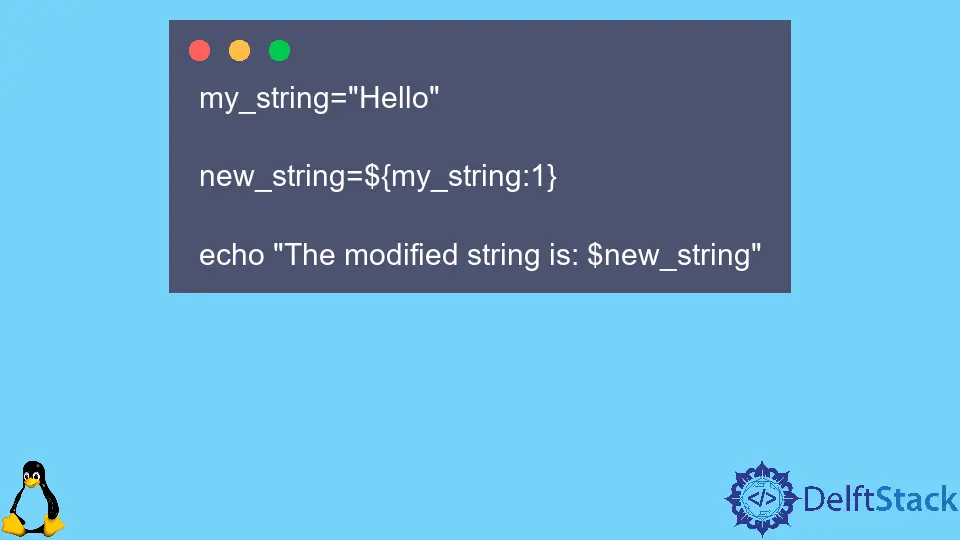How to Remove First Character From String in Bash
-
Use the
sedCommand to Remove the First Character From the String in Bash -
Use the
cutCommand to Remove the First Character From the String in Bash -
Use the
substringParameter to Remove the First Character From the String in Bash

Removing the first character of a string in Bash can be tricky, as there is no built-in function that can do this directly. However, there are several ways to achieve this, such as using the sed command, the cut command, or the substring parameter expansion.
This post will review how to use each approach to remove the initial character from a string in Bash.
Use the sed Command to Remove the First Character From the String in Bash
In Bash, you can delete the initial character of a string using the sed command, and we can use the s (substitute) command with the ^ (start of line) regular expression. The s command enables us to look for a pattern in a string and swap out that string for another string, while the ^ regular expression matches the start of the line.
For example, let’s say we have a string called my_string that contains the word Welcome, and we want to remove the first character (the letter W). We can use the sed command to achieve this:
my_string="Welcome"
new_string=$(echo "$my_string" | sed 's/^.//')
echo "The modified string is: $new_string"
Output:
The modified string is: elcome
In the code above, we use the sed command to search for the pattern ^. in the my_string variable and replace it with an empty string. The ^ character matches the start of the line, while the . character matches any single character.
The sed command will remove the string’s first character, the letter W.
The sed command output is then stored in the new_string variable, and we use the echo command to print the modified string. The output of the code should be The modified string is: elcome.
Use the cut Command to Remove the First Character From the String in Bash
Another Bash method for removing the first character from a string is to use the cut command, which allows us to extract a specified number of characters from a string. The cut command takes a string as input and outputs only the specified characters.
To remove the first character of a string using the cut command, we can use the -c option to specify the character positions to be extracted. For example, let’s say we have the same my_string variable containing the word “Hello”, and we want to remove the first character (the letter “H”). We can use the cut command to achieve this:
my_string="Hello"
new_string=$(echo "$my_string" | cut -c 2-)
echo "The modified string is: $new_string"
Output:
The modified string is: ello
In the code above, we use the cut command with the -c option to extract the characters from the second position (2) to the end of the string (-). This means that the cut command will remove the string’s first character, which is the letter “H” in this case.
The output of the cut command is then stored in the new_string variable, and we use the echo command to print the modified string. The output of the code should be “The modified string is: ello”.
Use the substring Parameter to Remove the First Character From the String in Bash
Finally, we can remove the first character of a string in Bash using the substring parameter expansion. This special syntax allows us to perform string manipulation operations on variables directly in the Bash script without using external commands like sed or cut.
To remove the first character of a string using the substring parameter expansion, we can use the ${string:position} syntax, where string is the variable containing the string, and position is the starting position of the substring to be extracted. For example, let’s say we have the same my_string variable containing the word Hello, and we want to remove the first character (the letter H). We can use the substring parameter expansion to achieve this:
my_string="Hello"
new_string=${my_string:1}
echo "The modified string is: $new_string"
Output:
The modified string is: ello
In the code above, we use the ${my_string:1} syntax to extract the substring starting from the second position (1) of the my_string variable. The first character (the letter H) will be removed from the string.
The substring parameter expansion output is then stored in the new_string variable, and we use the echo command to print the modified string. The output of the code should be The modified string is: ello.
In conclusion, there are several ways to remove the first character of a string in Bash, such as using the sed command, the cut command, or the substring parameter expansion. Each of these methods has its advantages and disadvantages, and the best choice will
Olorunfemi is a lover of technology and computers. In addition, I write technology and coding content for developers and hobbyists. When not working, I learn to design, among other things.
LinkedIn